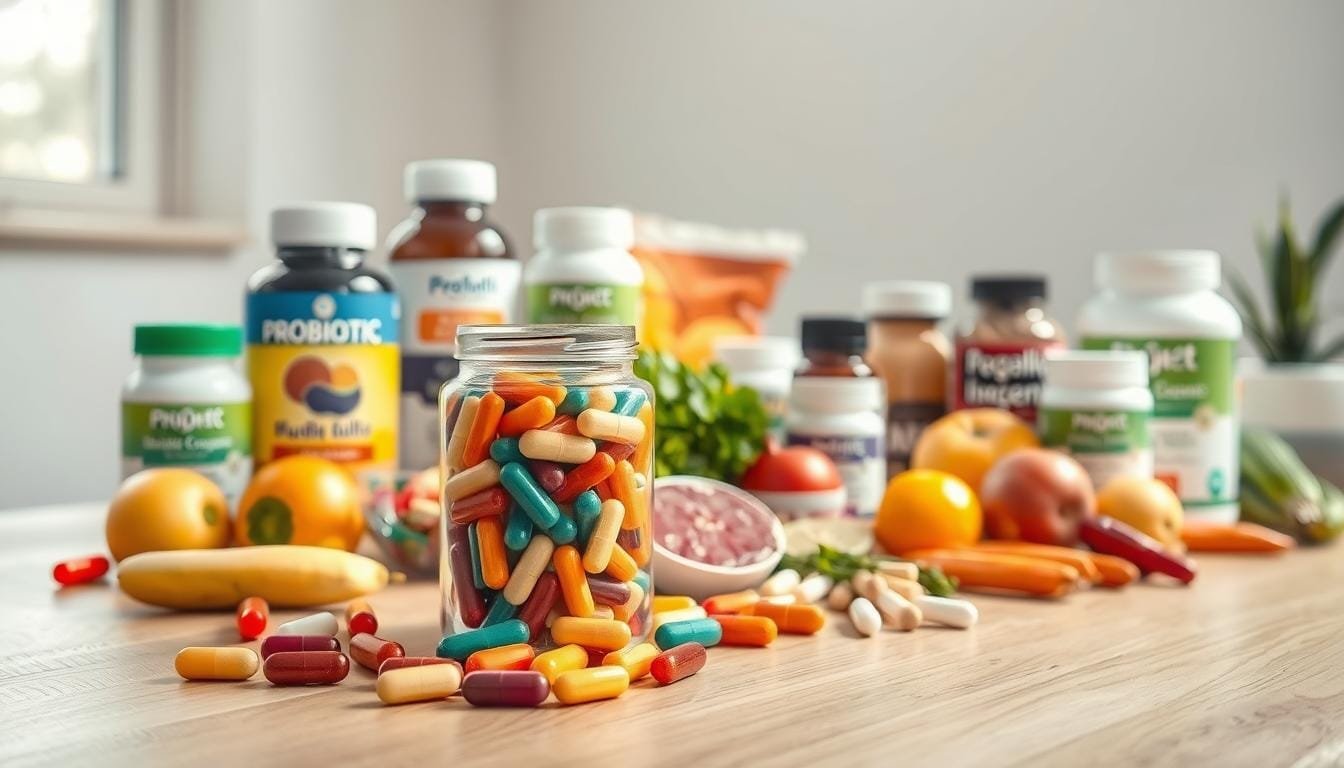Currently Empty: RM0.00
Did you know that over 70% of your immune system resides in your gut? This surprising fact highlights the importance of maintaining a healthy digestive system. Probiotics, live microorganisms that support gut health, play a crucial role in achieving this balance. Whether you’re new to probiotics or looking to optimize your routine, understanding the right approach can make all the difference.
Probiotics are live cultures that promote overall health and body balance. They help improve digestion, boost immunity, and even enhance mental well-being. However, not all probiotic supplements are created equal. Choosing a high-quality product ensures you get the maximum benefits. Scientific research suggests that timing matters, whether taken on an empty stomach or with food.
At Wellness Concept, we specialize in providing expert advice on probiotic usage. Our team is available via WhatsApp at +60123822655 during business hours (Monday to Friday: 9:30 am-6:30 pm; Saturday & Sunday: 10 am-5 pm). This article will guide you on the best practices for incorporating probiotics into your daily routine, ensuring you achieve optimal results.
Key Takeaways
- Probiotics are live microorganisms that support gut health and overall well-being.
- Consistency in taking probiotics is more important than specific timing.
- High-quality probiotic supplements ensure maximum health benefits.
- Scientific research supports both empty stomach and with food approaches.
- Wellness Concept offers expert guidance on probiotic usage for optimal results.
Understanding Probiotics and Their Benefits
The gut is home to trillions of microorganisms that influence overall health. These tiny organisms, including beneficial bacteria, play a crucial role in maintaining balance within the body. Probiotics are live microorganisms that, when consumed in adequate amounts, offer significant health benefits. They are found in various forms, from supplements to fermented foods, and are essential for supporting a healthy gut.
What Are Probiotics?
Probiotics are live bacteria and yeasts that promote health by balancing the gut microbiome. Common types include Lactobacillus and Bifidobacterium, each with unique benefits. For example, Lactobacillus acidophilus aids in lactose digestion, while Bifidobacterium longum supports immune function. These strains work together to maintain a healthy digestive system and protect the stomach from harmful bacteria.
Probiotic supplements come in various forms, such as capsules, tablets, and powders. They are designed to deliver specific strains of beneficial bacteria to the gut. Research shows that these supplements can help prevent dysbiosis, a condition where harmful bacteria outnumber the beneficial ones. By restoring balance, probiotics support overall health and well-being.
How Probiotics Support Gut Health
Probiotics play a vital role in maintaining gut health by adding beneficial bacteria to the microbiome. These bacteria help break down food, produce essential nutrients, and protect against harmful pathogens. Studies suggest that probiotics can reduce the risk of digestive issues like diarrhea and irritable bowel syndrome (IBS).
For instance, Saccharomyces boulardii, a yeast-based probiotic, is effective in combating diarrhea caused by antibiotics. Similarly, Lactobacillus rhamnosus has been shown to shorten the duration of acute diarrhea in children. By supporting the gut lining and enhancing immune function, probiotics contribute to a healthier digestive system.
Incorporating probiotics into your routine can be simple. Fermented foods like yogurt, kefir, and sauerkraut are natural sources of these beneficial bacteria. For those seeking targeted support, high-quality probiotic supplements are an excellent option. At Wellness Concept, we provide expert guidance to help you choose the right probiotic for your needs. Contact us via WhatsApp at +60123822655 for personalized advice.
Timing and Its Impact on Probiotic Effectiveness
The effectiveness of probiotics can depend on when and how you take them. While some manufacturers suggest an empty stomach, others recommend taking them with food. Research shows that timing can influence how well these beneficial bacteria survive and thrive in your digestive system.

Empty Stomach vs. With Food
Taking probiotics on an empty stomach may seem logical, but stomach acid can reduce their survival. Studies suggest that consuming them with a meal, especially one containing fats, can improve their effectiveness. For example, a small amount of oatmeal or low-fat milk can create a protective barrier against stomach acid.
Certain strains, like Lactobacillus plantarum, are more resistant to acidic conditions. However, others, such as Bifidobacterium, may need extra protection. This is why meal composition matters when taking probiotic supplements.
Research and Clinical Evidence
Clinical studies highlight the importance of timing. Probiotics taken 30 minutes before a meal show higher survival rates compared to those taken after eating. Foods like cooked oatmeal or low-fat milk can enhance the stability of these beneficial bacteria as they pass through the digestive tract.
According to Mayo Clinic, probiotics are live microorganisms that support gut health. Their effectiveness depends on factors like strain type, dosage, and timing. Consistency is key to maximizing their benefits.
While some strains, like Saccharomyces boulardii, can survive with or without food, others require specific conditions. Advanced manufacturing techniques, such as encapsulation, also play a role in improving probiotic stability.
When to take probiotics for best results
The right approach to probiotics can significantly enhance their benefits. While timing plays a role, consistency in intake is far more critical. Clinical studies reveal that regular use ensures these beneficial bacteria colonize the gut effectively.
General Recommendations and Consistency
Research suggests that certain strains, like Lactobacillus and Bifidobacterium, survive better when taken before meals. For example, a study found that consuming probiotics 30 minutes before breakfast improved their stability in the digestive tract. However, the best time to take them depends on the strain and individual needs.
Consistency is key. Taking probiotics daily, whether in the morning or evening, ensures a steady supply of beneficial bacteria. This regular intake helps maintain a balanced gut microbiome, which supports digestion, immunity, and overall health.
Research Insights on Timing
Clinical trials highlight that some strains thrive when taken with food. Foods like oatmeal or low-fat milk create a protective barrier against stomach acid, enhancing probiotic survival. For instance, Lactobacillus plantarum shows higher resistance to acidic conditions when consumed with meals.
Other strains, like Saccharomyces boulardii, can be taken at any time. Their resilience makes them effective regardless of meal timing. This flexibility allows users to incorporate probiotics into their routine without strict schedules.
Daily Intake Routines
To maximize benefits, consider the following tips:
- Take probiotics with a meal to protect them from stomach acid.
- Choose strains like Bifidobacterium or Lactobacillus for targeted support.
- Maintain a consistent schedule to ensure long-term gut health.
At Wellness Concept, we recommend starting with a high-quality supplement and sticking to a routine. Our team is here to guide you in selecting the right probiotic for your needs. For personalized advice, contact us via WhatsApp at +60123822655.
Optimizing Probiotic Intake with Your Meals
Pairing probiotics with the right meals can significantly boost their effectiveness. The composition of your meal plays a crucial role in ensuring these beneficial bacteria survive the journey through your digestive tract. By understanding how food interacts with probiotics, you can maximize their impact on gut health.

Meal Composition and Probiotic Survival
Certain foods can create a protective barrier for probiotics as they pass through the stomach. For example, meals with a small amount of fat or carbohydrates, like oatmeal or low-fat milk, can enhance probiotic survival. These foods help shield the bacteria from stomach acid, allowing more of them to reach the intestines.
Research shows that taking probiotics with meals improves their stability. Foods like fermented vegetables or yogurt also support probiotic effectiveness. By pairing your supplement with the right meal, you ensure these beneficial microorganisms thrive in your digestive system.
Selecting the Right Probiotic Supplement
Not all probiotic products are created equal. When choosing a probiotic supplement, look for key indicators of quality. Check the label for CFU (colony-forming units) guarantees and research-backed strains like Lactobacillus or Bifidobacterium. These strains are known for their resilience and health benefits.
The formulation of the product also matters. Capsules or beads designed to protect the bacteria during transit are ideal. High-quality supplements ensure that the probiotics reach your gut intact, where they can provide the most benefits.
Here are some tips for selecting the right product:
- Look for CFU counts in the billions for maximum effectiveness.
- Choose supplements with strains backed by clinical research.
- Opt for products with protective formulations like enteric-coated capsules.
By combining the right meal with a high-quality probiotic supplement, you can optimize their benefits. Consistency in intake and proper meal pairing are key to achieving long-term gut health.
Addressing Side Effects and Interactions
While probiotics offer numerous health benefits, some individuals may experience minor side effects. These are usually temporary and can be managed with simple adjustments. Understanding potential interactions with medications is also crucial for a smooth experience.
Managing Minor Side Effects
Common side effects like bloating, gas, or mild diarrhea may occur when starting probiotics. These symptoms typically subside as the body adjusts. Research shows that 10-20% of individuals experience these effects initially.
To minimize discomfort, consider taking probiotics at night. This reduces daytime stomach issues. Adjusting the timing or dosage can also help. For example, starting with a lower dose and gradually increasing it allows the body to adapt.
Here are some tips to manage side effects:
- Take probiotics with meals to reduce bloating and gas.
- Choose strains like Lactobacillus or Bifidobacterium, which are well-tolerated.
- Stay hydrated to support digestion and ease symptoms.
Potential Interactions with Medications
Probiotics can interact with certain medications, especially antibiotics. While antibiotics kill harmful bacteria, they may also affect beneficial strains. Taking probiotics 2-3 hours before or after antibiotics ensures both remain effective.
Some strains, like Saccharomyces boulardii, are resistant to antibiotics and can help prevent antibiotic-induced diarrhea. This occurs in about 30% of patients. Always consult a healthcare provider if you’re on medication or have a specific condition.
Here’s how to navigate interactions:
- Space out probiotic and antibiotic intake to avoid interference.
- Choose strains that complement your health needs.
- Discuss your regimen with a professional for personalized advice.
At Wellness Concept, we’re here to guide you. Contact us via WhatsApp at +60123822655 for expert support on probiotic usage and minimizing side effects.
Conclusion
Maintaining a healthy gut is essential for overall well-being, and probiotics play a key role in achieving this balance. While timing matters, consistency in taking a probiotic supplement is the most important factor for long-term gut health. Research shows that daily intake helps beneficial bacteria thrive in the microbiome, supporting digestion and immunity.
Incorporating probiotics into your routine can be simple. Pairing them with meals, especially those containing fats or fibers, enhances their effectiveness. High-quality supplements, like those with Lactobacillus or Bifidobacterium, ensure maximum benefit. Consulting a provider can help tailor the approach to your needs.
By adopting a consistent routine, you can enjoy sustained health benefits. Whether in the morning or evening, making probiotics a part of your day is a small step with big rewards for your gut health.
FAQ
What are probiotics?
Probiotics are live microorganisms, often referred to as “good bacteria,” that support digestive health and overall wellness. They are found in certain foods like yogurt, kefir, and fermented vegetables, as well as in supplement form.
How do probiotics benefit gut health?
Probiotics help maintain a balanced gut microbiome by promoting the growth of beneficial bacteria. They aid in digestion, reduce bloating, and may alleviate symptoms of conditions like diarrhea or irritable bowel syndrome (IBS).
Should probiotics be taken on an empty stomach or with food?
Research suggests that taking probiotics with a meal, especially one containing healthy fats, can improve their survival through stomach acid. This enhances their effectiveness in reaching the gut.
What is the best time of day to take probiotics?
Consistency is key. Many people find it convenient to take probiotics with breakfast or dinner. The timing matters less than ensuring they are taken regularly to maintain gut health.
Can probiotics interact with medications?
Probiotics may interact with certain medications, such as antibiotics or immunosuppressants. It’s important to consult a healthcare provider before starting a probiotic regimen if you’re on medication.
What should I look for in a probiotic supplement?
Choose a product with multiple strains of bacteria, a high CFU (colony-forming units) count, and a reputable brand. Look for supplements that are shelf-stable or refrigerated, depending on the strain’s requirements.
Are there any side effects of taking probiotics?
Some people may experience mild side effects like gas or bloating when starting probiotics. These usually subside as the body adjusts. If symptoms persist, consult a healthcare professional.
How long does it take to see results from probiotics?
Results vary depending on the individual and their gut health. Some people notice improvements in digestion within a few days, while others may take several weeks to experience benefits.



